Newsletter
How American Public Spaces Became so Criminalized—and How We Can Win Them Back
On September 23, 2020, a Black man died for the alleged crime of crossing the street the wrong way. His death was due in large part to America’s long history of criminalizing public spaces and our existence in them.


How American Public Spaces Became so Criminalized—and How We Can Win Them Back
Nneka Ewulonu
On September 23, 2020, a Black man died for the alleged crime of crossing the street the wrong way. That day, two Orange County, California, sheriff’s deputies claimed they saw a Black man, Kurt Reinhold, jaywalking. The cops stopped Reinhold and attempted to arrest him. Reinhold called the jaywalking stop “ridiculous” and asked the sheriffs to stop touching him. The deputies then claimed he was resisting arrest. According to video clips, police then escalated the situation and subsequently shot Reinhold twice, killing him.
Reinhold’s death was due in large part to America’s long history of criminalizing public spaces and our existence in them. As such, it’s far past time to reexamine whether some “public” behaviors merit criminalization. Many of these laws have explicitly racist or classist roots. When laws were born directly out of Jim Crow-era racism and continue to be enforced disproportionately against people of color today, these laws must fall.
So, here’s a rundown of how many of our laws criminalizing public spaces came about.
Jaywalking
A picture of city streets from about 120 years ago has obvious differences: building heights, clothing, et cetera. But another jarring difference is the status of the public sphere in general. As a 2015 piece on the history of jaywalking by Vox notes, people, machines, and even animals shared the streets. Pedestrians crossed the street freely. As cars took off in the early 20th Century, so did the number of fatal car crashes.
Cars were quickly demonized as dangerous, and the auto industry began its own advocacy in response. The 1920s saw a flurry of crosswalk ordinances due to campaigning from the industry. Auto industry lobbyists popularized the term “jaywalking.” Since “jay” was an offensive synonym for “hick” at the time, the term implied that jaywalkers were ignorant of the societal and safety norms in cities. As cars grew in popularity, pedestrians lost their rights to the road, culminating in states today that do not give pedestrians the right of way.
Vagrancy, Loitering, and Trespassing Laws
Laws regarding vagrancy — lacking a permanent job, home, or material resources — and loitering have existed in America for more than a century. According to a 2020 piece by The Week, states during the Jim Crow era passed laws that made it a crime not to work and then selectively enforced those laws against the recently freed Black population. Soon came loitering laws, which criminalized “strolling about in idleness” and were also enforced overwhelmingly against Black people. These laws, while not expressly discriminatory, gave police pretexts to stop, harass, or ultimately arrest Black individuals for the crime of existing freely in the public sphere.
Laws against trespassing don’t have as direct ties to Jim Crow but still can result in racist enforcement. In April 2018, two Black men were sitting in a Starbucks waiting for a third person when a store manager called 911, alleging the two men were not patrons and refused to leave. The two men were arrested and spent eight hours in jail before being released without charges for doing nothing other than sitting in a coffee shop. While courts have significantly narrowed loitering and related ordinances in more recent years, the murder of Ahmaud Arbery, who was killed while going on a jog, shows that Black public existence continues to be questioned and can have lethal consequences.
Curfews
Curfews also have racist, anti-Black roots. The quintessential examples of curfews in America are sundown towns: municipalities in which people of color, and especially Black people, were expected to be out of town by the time the sun set, lest they face harassment or worse. These laws and informal rules made it clear that Black people were unwelcome by majoritarian society. The state continues to this day to use curfews as a direct tool of societal control. During the George Floyd protests of summer 2020, at least 39 cities around the country enacted curfews as an attempt at quelling civil unrest. When these authoritarian curfews were violated, many law enforcement departments used items like rubber bullets to disperse protestors. When the state dislikes how its citizens are reclaiming public spaces, the state will use violence to protect its own interests.
Homelessness
Housing crises are fueling the most recent campaign to criminalize public existence. In 2022, several state governments passed anti-camping laws that criminalize sleeping in public spaces. Tennessee recently enacted HB 0978/SB 1610, which makes it a felony to sleep on public property. Missouri passed a similar law, making it a misdemeanor to sleep on state property. Neither of these laws came paired with initiatives to provide permanent housing or help people find places to sleep. These kinds of laws reinforce that only certain individuals can benefit from public spaces.
Some jurisdictions are walking back their criminalization of public existence. As of June 2022, 12 million Americans live in a jurisdiction where jaywalking is no longer a crime. Colorado is using $95 million to create two transitional housing campuses in the state for unhoused individuals, the largest anti-homelessness initiative ever seen in the state. Boston, MA, Kansas City, MO, and Olympia, WA, mayors have made some or all public transit free in their respective cities. These positive changes are hopefully the start to us demanding back greater freedom in public spaces.
In the news
Adnan Syed, the subject of the podcast Serial, was freed Monday, more than 20 years after his conviction for a murder he maintains he did not commit. The judge placed him on home detention while prosecutors decide whether to drop his charges or retry him. [Alex Mann and Lee O. Sanderlin / The Baltimore Sun]
At least 23 jails in the Midwest have been proposed for or constructed on toxic or hazardous sites—with many projects using federal funds meant for COVID relief. [Adam Mahoney / Capital B] From The Appeal: Billions of pandemic relief dollars are flowing to law enforcement sources across the country, including to fund the construction of new jails and prisons. Read more here on the fight for—and against—that spending.
Between October 2019 and March 2022, judges in two federal districts in Georgia granted only 1.7 percent and 2.2 percent of requests for “compassionate release” by federal prisoners, the fewest of any district in the country. [Jake Shore / The Current]
Vera’s Sam McCann spoke with prosecutors about why they won’t enforce anti-abortion laws. “Criminalizing abortion undermines public safety and public trust,” said Georgia’s DeKalb County District Attorney Sherry Boston. [Sam McCann / Vera Institute of Justice]
New York City has been under a court mandate to reform the Rikers Island jail complex for seven years. With 14 deaths at the complex in 2022 and few signs of progress, advocates and officials are calling for a federal judge to appoint a third party to run the jail. [Fola Akinnibi / Bloomberg CityLab]
ICYMI — from The Appeal
HIV criminalization laws are disproportionately wielded against Black and brown people living with the virus, and continue to be applied in cases where there is little or no possibility of transmission, Adam Rhodes reports.
Elizabeth Weill-Greenberg was on KPFA’s Law and Disorder to discuss her reporting on the Los Angeles County Jail’s Inmate Reception Center.
That’s all for this week. As always, feel free to leave us some feedback, and if you want to invest in the future of The Appeal, please donate here.
